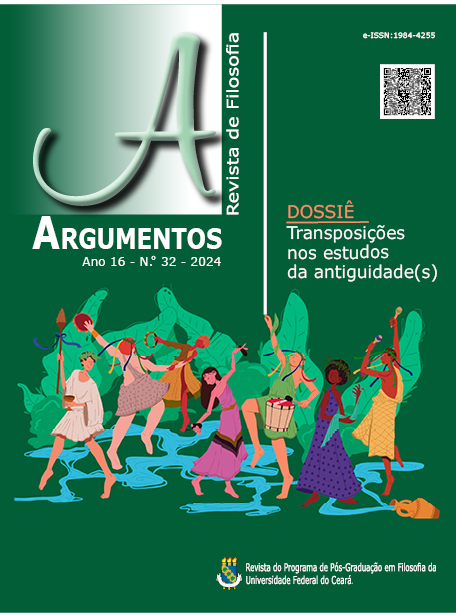Dion Chrysostom’s palimpsest in Discourses 11, 37-43
Keywords:
Helen in Egypt. Herodotus. Stesichorus. Plato. Dion. The Returns.Abstract
Herodotus founded the literary topic of collecting information from Egyptian priests, at a time when the Greeks’ fascination with the Egyptians was clear. From then on, the Egyptians became a model of stored knowledge and civilization. We will see how, in three important moments, this encounter with Egypt is narrated from the Greek perspective and invention (heuresis, inventio) and how the Egyptian priests represent a superior knowledge safeguarded by writing. Our focus, however, is on recognizing, in these historical layers, Dion’s palimpsest, that is, the literary assimilation of the commonplaces presents in Herodotus, Plato, Stesichorus, the Trojan Cycle and probably also in Returns of Agias of Troezen.
References
ARISTOTLE. The “art” of rhetoric. Cambridge: Harvard University Press, 2006.
AUSTIN, N. Helen of Troy and her shameless phantom. New York: Cornell University Press, 1994.
BERGK, T. Poetae lyrici graeci. Vol. 3. Leipzig: Teubner, 1897.
BERNABÉ, A. Poetarum Epicorum Graecorum Testimonia et Fragmenta. Pars I. Stuttgart; Leipzig: Teubner, 1996.
BOWRA C. M. Stesichorus in the Peloponnese. The Classical Quarterly, v. 28, n. 2, 1934, p. 115-119.
BOWRA C. M. The two palinodes of stesichorus. The Classical Review, v. 13, n. 3, 1963, p. 245-252.
BUZELLI, J. L. S. Fragmentos da poesia épica e cômica. São Paulo: Odysseus, 2019.
CAMPOS, R. G. de. Helena no Egito sem eídōlon: Estesícoro e os Retornos de Ágias de Trezeno em Heródoto 2. 111-120. CODEX – Revista de Estudos Clássicos, Rio de Janeiro, v. 9, n. 2, 2021, p. 1-25.
DAVIES, M. Poetarum Melicorum Graecorum Fragmenta. Oxford: Oxford University Press, 1991.
DIO CHRYSOSTOM. Complete Works. United Kingdom: Delphi Classics, 2017.
DIO CHRYSOSTOM. Dionis Prusaensis, quem vocant Chrysostomum, quae exstant omnia. Berlin: Weidmann, 1893.
HARTOG, F. The mirror of Herodotus. California: University of California Press, 1988.
HERODOTI. Historiae. Libri I-IV. Oxonii. Oxford: Oxford University Press, 1988.
HUNTER, R. The trojan oration of Dio Chrysostom and Ancient Homeric Criticism. In: GRETHLEIN, J.; RENGAKOS, A. (Eds.). Narratology and interpretation. The content of narrative form in ancient literature. Berlin; New York: Walter de Gruyter, 2009. p. 43-61.
KELLY, A. Stesikhoros and Helen. Suisse: Museum Helveticum, 2007.
LATTIMORE, R. Herodotus and the Names of Egyptian Gods. Classical Philology, v. 34, n. 4, 1939, p. 357-365.
LLOYD, A.B. Herodotus. Book II: Commentary 99-182, Études préliminaires aux religions orientales dans L’Empire romain. T.43. Leiden; New-York: E.J. Brill, 1993.
MARTIN L. West, Greek Epic Fragments. Cambridge; London: Harvard University Press, 2003.
PAGE, D. L. Poetae Melici Graeci. Oxford: Clarendon Press, 1962.
PLATO. Phaedrus. Translation and commentary by C. J. Rowe. Warminster: Aris & Phillips, 1986.
PLATON. Timée. Ouvres completes. Tome X. Paris: Les Belles Lettres, 2002.
POWELL, E. A Lexicon to Herodotus. Cambridge: Cambridge University Press, 1938.
SCAFOGLIO, G. Proclo e Il Ciclo Epico. Göttinger Forum für Altertumswissenschaft, n. 7, 2004, p. 39-57.
SEVERYNS, A. Recherches sur la Chrestomathie de Proclos. Vol. IV. Paris: Les Belles Lettres, 1963.
SIDER, D. The Blinding of Stesichorus. Hermes, 117. Bd., H. 4, 1989, p. 423-431.
WEST, S. Proteus in Stesichorus’ Palinode. Zeitschrift für Papyrologie und Epigraphik, 47 Bd.,1982, p. 6-10.
Downloads
Published
Issue
Section
License
Argumentos magazine is licensed under an International Creative Commons Attribution License.
The Magazine uses CC BY inclusion
1) The authors retain the copyright granted to the magazine or the right to initial publication, with the work regularly licensed under the Creative Commons Attribution, which allows the sharing of the work with acknowledgment of authorship and initial publication in this magazine.
2) The authors are authorized to contract additional applicable contracts, for non-exclusive distribution of the version of the work published in this journal (for example, publication in the institutional repository or as a chapter of the book), recognition of authorship and initial publication in this journal.
3) Authors are authorized and encourage to publish and distribute their work online (for example, in institutional repositories or on their personal pages) at any time before or during the editorial process, as they can generate productive changes, as well as increase the impact and reference of published work.




.jpg)










._._3.png)
1.jpg)
._._._.png)
